

Deforestation. Solutions to Deforestation. The causes of deforestation and degradation vary from region to region.
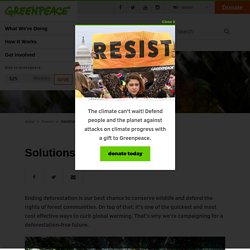
In the tropics, agribusiness clears forests to make space for things like cattle ranching, palm oil and soy plantations for animal feed. Demand for wood products can threaten forests around the world, whether it is for throw-away paper products or hardwood flooring. In too many parts of the world, ineffective or corrupt governments make things worse by opening the door to illegal logging and other crimes. Read more about the drivers of deforestation. Solving Deforestation Deforestation and degradation are a complex problems.
The Power of the Marketplace If corporations have the power to destroy the world’s forests, they also have the ability to help save them. 'Brazil drought linked to Amazon deforestation' Wildfires Article, Forest Fires Information, Wildland Fires Facts. Uncontrolled blazes fueled by weather, wind, and dry underbrush, wildfires can burn acres of land—and consume everything in their paths—in mere minutes.

On average, more than 100,000 wildfires, also called wildland fires or forest fires, clear 4 million to 5 million acres (1.6 million to 2 million hectares) of land in the U.S. every year. In recent years, wildfires have burned up to 9 million acres (3.6 million hectares) of land. Rainforest Information for Kids. Cheetos in crosshairs of deforestation controversy - Mar. 30, 2016. SumOfUs, an online consumer advocacy group, launched a campaign against Cheetos saying that its palm oil policy doesn't go far enough to ensure that it is deforestation-free.
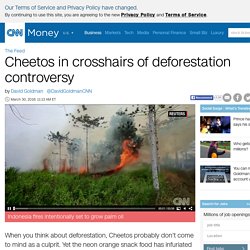
Palm oil has been a problematic ingredient, because it is often obtained by clearing rainforests, according to the World Wildlife Federation. That has threatened the habitats of many endangered species, including elephants, orangutans, rhinoceroses and tigers. Cheetos maker Frito-Lay, a subsidiary of PepsiCo (PEP), has committed to using sustainable palm oil that is grown on plantations -- not in rainforests. But that pledge doesn't take full effect until 2020.
Yet SumOfUs has called PepsiCo's commitment "weak," criticizing Pepsi for its lack of enforcement. "PepsiCo's palm oil policy is a step in the right direction, but it doesn't really do enough to prevent deforestation," said Katherine Tu, campaign leader at SumOfUS. A spokeswoman for Pepsi denied that IndoFood was excluded from its palm oil pledge.
Deforestation. Forests cover 31% of the land area on our planet.
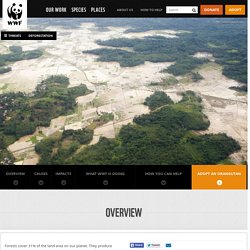
They produce vital oxygen and provide homes for people and wildlife. Rain Forest Threats, Rain Forest Species. More than half of Earth’s rain forests have already been lost forever to the insatiable human demand for wood and arable land.

Rain forests that once grew over 14 percent of the land on Earth now cover only about 6 percent. And if current deforestation rates continue, these critical habitats could disappear from the planet completely within the next hundred years. The reasons for plundering rain forests are mainly economic. Wealthy nations drive demand for tropical timber, and cash-strapped governments often grant logging concessions at a fraction of the land’s true value. “Homesteader” policies also encourage citizens to clear-cut forests for farms. CNN Explains: Deforestation. Deforestation - Wikipedia. Conversion of forest to non-forest for human use Deforestation has many causes: trees can be cut down to be used for building or sold as fuel (sometimes in the form of charcoal or timber), while cleared land can be used as pasture for livestock and plantation.
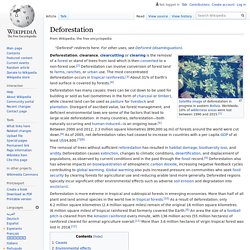
Disregard of ascribed value, lax forest management, and deficient environmental laws are some of the factors that lead to large-scale deforestation. In many countries, deforestation—both naturally occurring and human-induced—is an ongoing issue.[5] Between 2000 and 2012, 2.3 million square kilometres (890,000 sq mi) of forests around the world were cut down.[6] As of 2005, net deforestation rates had ceased to increase in countries with a per capita GDP of at least US$4,600.[7][8] The removal of trees without sufficient reforestation has resulted in habitat damage, biodiversity loss, and aridity. Deforestation is more extreme in tropical and subtropical forests in emerging economies.
Causes Environmental effects Atmospheric Soil Notes. Deforestation. Deforestation Facts for Kids - The World Counts. TheWorldCounts, 22 July, 2014 When you see paper and wood, what do you think of?
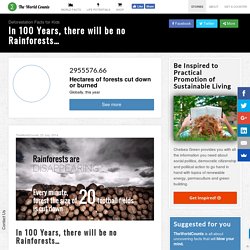
Do you think of the tree that was felled to make the product? Before we started to build cities many centuries ago, they say that 60% of the Earth was covered in Forests. Now, there is less than 10% left. Deforestation is when forests are converted for other purposes by cutting down the trees to clear the land for other use. What you need to know about Deforestation Can you imagine Earth without forests? 13 million hectares of forest have been cleared for other uses or by natural disaster. More facts: Rainforests cover only 6% of the world’s surface… yet they are home to more than 50% of the plant and animal species on Earth.A patch of rainforest measuring 4 square miles can contain as many as 1,500 flowering plants, 400 species of birds, 750 species of trees and 150 species of butterflies.
Why are Rainforests Important? Rainforests help regulate the Earth’s temperature and weather patterns. Reduce.